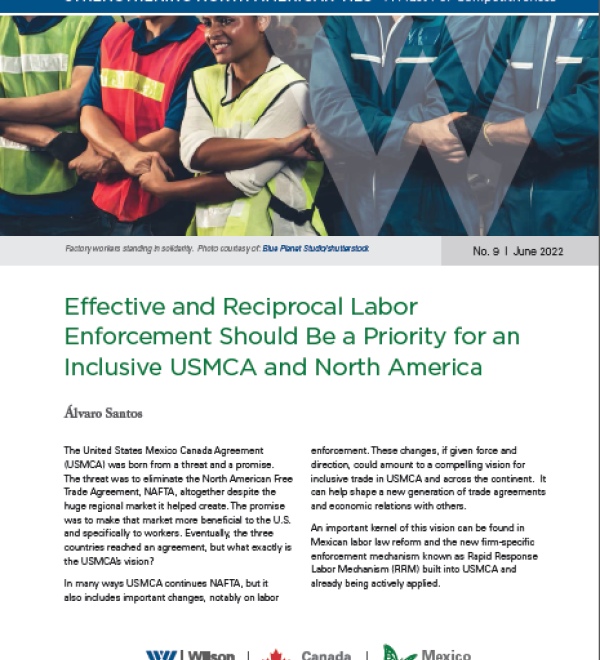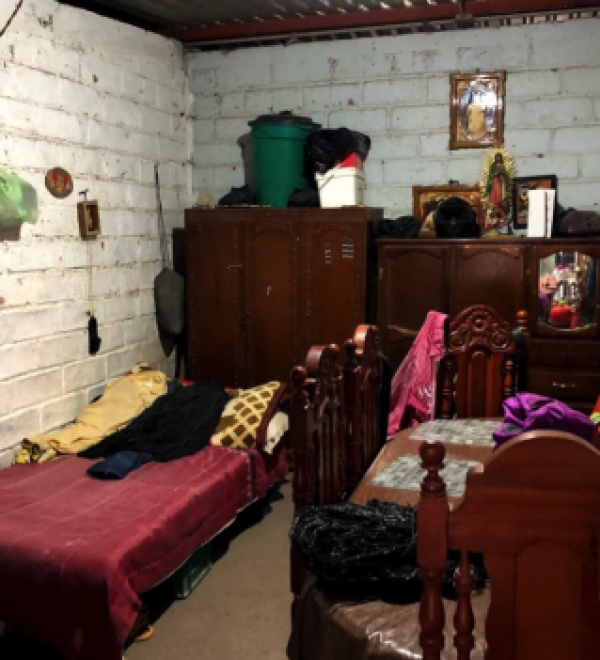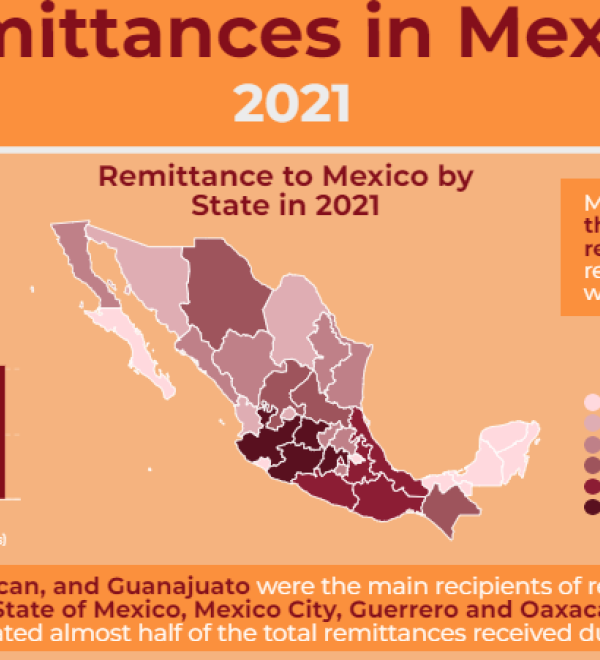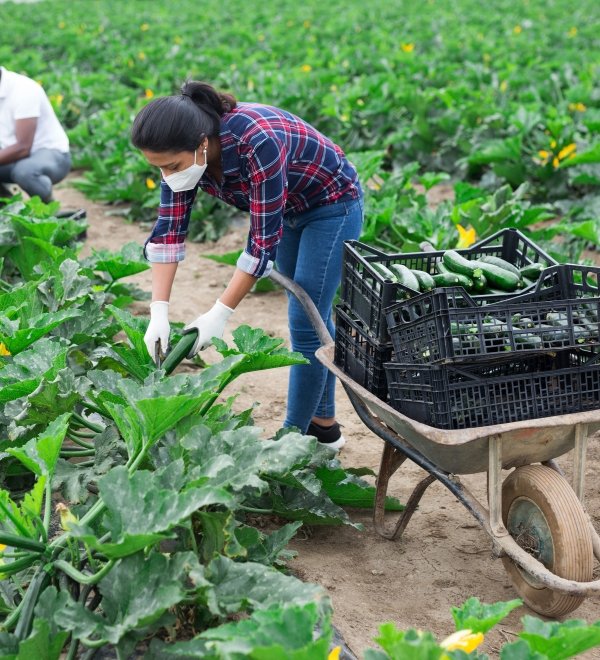Shutterstock

Migration & Migrants
Mexico Institute work on migration covers key topics, including migration from Central America, farm labor and migrant workers' rights, border security, and opportunities for bilateral cooperation on migration.
Connect With Us
Our Blogs
The Mexico Institute works to bring together federal, state, and local policymakers from both countries, as well as civil society, to address shared binational challenges on migration, including improving enforcement regimes, addressing development needs, and preparing both governments for the administrative challenges of legal reform. The Mexico Institute has partnered with Migration Dialogue, the Center for Research and Higher Studies in Social Anthropology (CIESAS-Occidente), and the Walmart Foundation to study working conditions for migrant farmworkers in Mexico. In the study, we analyze production and employment systems in selected commodities that are exported from Mexico to the United States, interview farm workers to learn about worker characteristics and migration patterns and conduct focus groups to better understand the operation of the farm labor market, and identify gaps in labor protections.

Farm Labor and Mexico's Export Produce Industry
This is a collaborative project led by the Wilson Center's Mexico Institute and funded by a grant from the Walmart Foundation with research support from the Center for Research and Higher Studies in Social Anthropology (CIESAS-Occidente) and Migration Dialogue. In the study, we analyze production and employment systems in selected commodities that are exported from Mexico to the United States, interview farm workers to learn about worker characteristics and migration patterns and conduct focus groups to better understand the operation of the farm labor market, and identify gaps in labor protections.
Learn MoreRecent Publications on Migration

Effective and Reciprocal Labor Enforcement Should Be a Priority for an Inclusive USMCA and North America

Poverty and Agricultural Labor in the Culiacán Valley 2010-2020

Infographic | Remittances in Mexico Reach a Historic High
2021 marked a year of historically high remittances to Mexico, with the country receiving over 51.6 billion dollars. In this infographic, Mexico Institute intern Jazmin Aguilar Rangel provides an overview of remittances to Mexico in 2021, details remittances on a state level, and shows their correlations with Migration.

H-2A: Recruitment and Adverse Effect Wage Rates (AEWRs)
Through the United States' H2-A program, farmers who anticipate labor shortages can recruit and employ foreign works to fill seasonal jobs. There are more workers who want H-2A visas than there are H-2A jobs, so some workers pay recruiters for jobs. In this article, Philip Martin describes the recruitment process for H2-A workers, describes challenges they may face in obtaining fair wages, and presents survey data on North American farm workers.
Other Initiatives on Migration and Migrants
Regional Migration Study Group
In 2014, the Wilson Center’s Mexico Institute and Latin American program and the Migration Policy Institute partnered to facilitate a series of conversations about developing a collaborative, regional approach to these issues. The Regional Migration Study Group, consisting of two dozen former officials, civil-society leaders, policy intellectuals, and specialists in the United States, Mexico, El Salvador, Guatemala, and Honduras, met twice yearly over a three-year period. The Study Group was co-chaired by former Mexican President Ernesto Zedillo, former US Secretary of Commerce Carlos Gutierrez, and former Guatemalan Vice President Eduardo Stein.
US-Mexico Migration Dialogue
From 2010-2011, the Mexico Institute launched a project that sought to generate a dialogue on the practical steps that the two governments can take to address bilateral migration issues. It brought together federal, state, and local policymakers from both countries, along with civil society stakeholders, to discuss how policy may be improved to better manage migration flows, protect migrants, and ensure their successful integration. As part of these discussions, a paper was published by the Chief Justice Earl Warren Institute on Race, Ethnicity & Diversity at the University of California, Berkeley Law School in February 2011. The report, titled “Borders, Jails, and Jobsites: An Overview of Federal Immigration Enforcement Programs in the US”, provided an overview of the current state of immigration enforcement in the US in order to facilitate a productive discussion toward reform
Latino Migrant Civic And Political Participation
From 2006-2009, this project documented the ways in which Latin American immigrants are engaging civically and politically in diverse communities of settlement in the United States. The project included case studies of nine US cities; some with longer histories of immigration, others more recent sites of long-term settlement. The Mexico Institute also published several research paper series looking at civic engagement and political participation of Latino immigrants in the United States:
Context Matters
The project sought to document the ways in which Latino and Latin American immigrants are expressing themselves politically and civically in new communities of settlement in the United States and as transnational actors. The significant influence of Latino voters in the 2008 elections reinforced a need to better analyze the evolving phenomenon of immigrant integration, particularly in regions of the country that are historically unaccustomed to assimilating recent Latino populations. This project consisted of a national report along with nine city reports: Charlotte, NC; Washington, DC; San Jose, CA; Las Vegas, NV; Omaha, NE; Tucson, AZ; Los Angeles, CA; Fresno, CA; and Chicago, IL. All publications are available in English and Spanish.To view discussions from the conference on "Latino Immigrant Civic Engagement Trends,'' click here.Invisible No More
This report explored the various ways that Mexican migrants to the United States are becoming civically and politically active in both countries. This collection of brief essays looked at how recent migrants interact with traditional Latino organizations, the labor movement, religious communities, the media, and both the US and Mexican political systems, transforming each through their engagement. This publication was the result of a conference held on November 4–5, 2005 at the Woodrow Wilson Center, co-sponsored by the Department of Latin American and Latino Studies at the University of California, Santa Cruz. The conference brought together migrant leaders, scholars, and representatives of civic, labor, and religious organizations. Jonathan Fox, Gaspar Rivera-Salgado, and Xóchitl Bada organized this conference, with support from Andrew Selee and Kate Brick at the Wilson Center.Additional Research Papers
These papers complement the investigations in the "Context Matters" and "Invisible No More" series